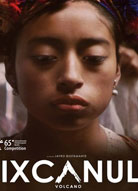Three quick takes on foreign film competitors from the long list of eligible titles, all screened at AFI.
 Mustang (France) Opens November 20th in select cities. Cohen Media Group.
Mustang (France) Opens November 20th in select cities. Cohen Media Group.
Given that 2015's loudest topic may well be the need for fresh cinematic female voices, the French/Turkish production Mustang deserves $100 million blockbuster status instead of art house ghettoization with a $300,000 gross which is what they're infinitely more likely to get. Director Deniz Gamze Ergüven and screenwriter Alice Winocour, two very talented women, team up to tell the riveting story of five spirited sisters living with their hands-off grandma who keep colliding with the confines, literal and metaphoric, of the patriarchy. An innocent 'schools out for the summer' beach romp prompts the end of their adolescent abandon as their horrified conservative uncle steps in to shape them up, train them to be subservient wives, and marry them off to respectable families. Though the premise is reminiscent of Sofia Coppola's elegiac and dreamy Virgin Suicides, the execution is not. Ergüven and Winocour are more physically grounded and rambunctous in their presentation and there is no distancing conceit of viewing the sisters through the eyes of boys. Mustang has successfully rowdy comedic moments, an earthy non-exploitive sensuality, often clever visual framing, and even a hard-won scrappy optimism to balance out its tough reality checks. In short: it's excellent. Let's hope the Foreign Film Oscar Committee agrees. A-
(See also: Amir's TIFF Review)
 Ixcanul (Guatemala) -Kino Lorber will distribute in the US. Dates TBA
Ixcanul (Guatemala) -Kino Lorber will distribute in the US. Dates TBA
At the well attended premiere of this memorable Guatemalan Oscar submission (their first!), the director brought out, not one of the actresses, but an older woman dressed in South American finery who was some kind of public official/icon (the applause was so loud I missed her title/name). The takeaway of the intro was that Guatemala has a tiny but newly excited film industry and they're extremely proud of this little movie. As well they should be. Ixcanul (or Volcano) looks at a poverty-stricken Kaqchikel family, living next to an active volcano and working on a coffee plantation. The volcano, in addition to being a beautiful and alien visual backdrop for a movie is also a monolithic wall, blocking their view of the rest of the world; Mexico and the United States, to the North, are more myth than reality. The family hopes to marry their sexually curious daughter off to their comparatively rich boss and thereby lift all their futures. Needless to say, things don't go as planned. While the actions of nearly all the characters are often enraging, Ixcanul is never mean spirited, condemning the exploitation of their ignorance rather than the ignorance itself. (One heartbreaking emergy trip to a nearby city shows the family utterly at the mercy of an untrustworthy translator since they don't even speak Spanish in the mountains.) Bustamante's well crafted film is authentically steeped in a nearly alien culture but its humanity is entirely familiar. B
 El Club (Chile) - Music Box Films will distribute in the US. Dates TBA
El Club (Chile) - Music Box Films will distribute in the US. Dates TBA
My first encounter with the acclaimed director Pablo Larrain was the violent Tony Manero, a film about a Chilean sociopath obsessed with winning a Saturday Night Fever lookalike contest. It was altogether unsavory and though the director's command was evident I couldn't wait for it to end. The second was the wondrous No, starring Gael García Bernal as an unlikely hero who helps rid his country of their dictator through an unlikely ad campaign. Though not without its necessarily dark moments -- all the Larrain films I've seen take place during the Pinochet era in Chile -- it was an exuberant, moving, and technically amazing film which I was happy to champion; it went on to be nominated for Best Foreign Film at the Oscars. The third encounter is, sadly, more reminiscent of the first in its absolute mandate to rub your face, artfully, in brutal shit.
The film begins deceptively as a mellow observational drama about a strange retirement community in a yellow house by the sea. Shortly, though, the curtain of ambiguity is lifted by an uninvited drunk stranger who stands outside the house spewing a hostel tirade of obscenities. The house, you immediately realize, is a shelter/prison for criminal priests that the Catholic Church is hiding away and the man shouting was one of their victims, repeatedly raped as a young boy. The depressing reveal deepens when you realizes that there are houses like this all over the world.
Fans of disturbing cinema might admire Larraîn's chutzpah but everyone else should steer clear. Though the film has strong performances, particularly Antonia Zegers as a despicable nun and Marcelo Alonso as a remarkably stone-faced priest sent to assess the inhabitants of the house, it's a tough sit through spiritual rationalization, disturbing psychologies, and actual brutality [SPOILER WARNING] Animals are viciously killed in the film -- albeit just barely off camera -- and I never would have seen it if I had known. [/SPOILER]. Even the resolution, which could be read as spiritually uplifting is ambiguous; it played for me more like a sick pitch-black joke about "penance" and "redemption". (I will be wary of seeing another Larraîn film despite my love for No.) No Rating.
 Thursday, September 8, 2016 at 10:45AM
Thursday, September 8, 2016 at 10:45AM 






